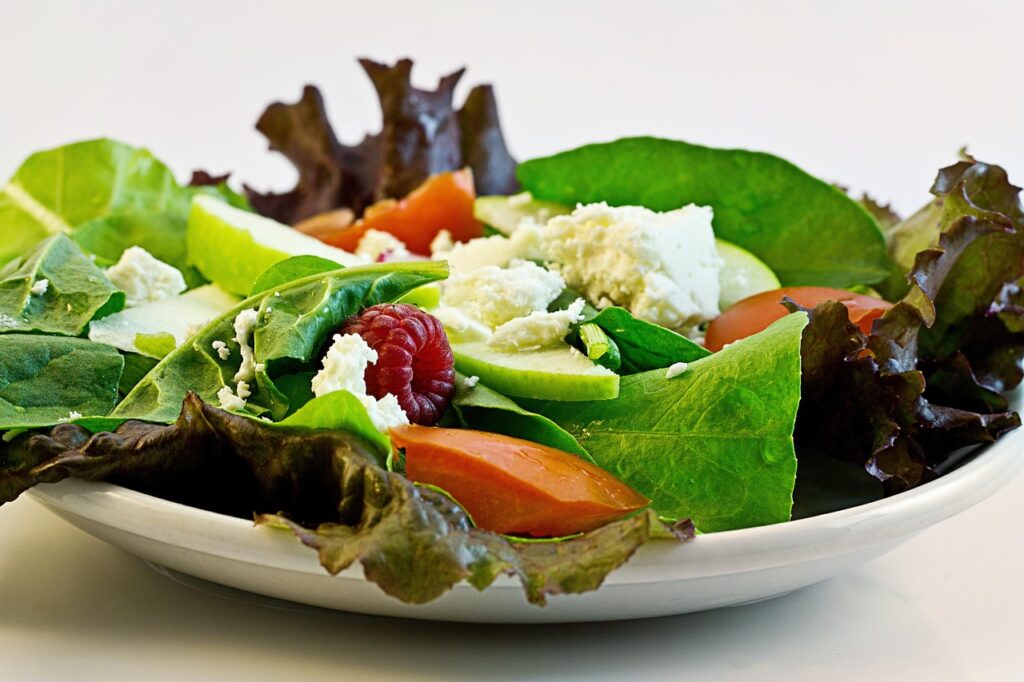What is a balanced diet?
In general diet that contains a variety of foods usually provides an adequate amount of the nutrients needed for good health, and provides satisfaction in terms of eating as well. A balanced provides provides our bodies with good food. A balanced diet gives your body what it needs for it to function properly. To get the nutrition you require, as a general principle, most of your daily calories should come from fresh fruits, fresh vegetables, whole grains, legumes, nuts, and lean proteins.
Key Elements of a Balanced Diet
A balanced diet gives your body the necessary nutrients to function effectively. It supports energy levels, contributes to growth, bolsters and strengthens immunity, and protects against diseases.
- 1. Carbohydrates – the primary energy source
- Function: Fuels the body for daily activities and brain function
- Examples: rice, bread, pasta, potatoes, fruits, vegetables, oats
- Choose complex carbohydrates (whole grains) instead of refined carbohydrates (white bread)
- 2. Protein – the body builders
- Function: Building and repairing tissues; supporting immune function
- Examples[>:eggs, chicken, fish, lentils, beans, milk, tofu, nuts
- Be sure to include plant and animal-based sources to increase variety
- 3. Fats – essential in small amounts. Function: energy storage, hormone production, absorbs vitamins A, D, E, K Examples: nuts, seeds, avocados, olive oil, ghee, fatty fish. Prefer unsaturated fat over saturated fats
- 4. Vitamins – Support body processes
* Function: Immunity, skin, eyes, bones, healing, metabolism.
* Examples: Fruits, vegetables, eggs, dairy.
* Consume a variety/color of foods to ensure all vitamins are obtained.
- 5. Minerals – Build and regulate the body
* Function: Bone health, nerve function, blood formation.
* Examples:
– For calcium: milk, yogurt, leafy green vegetables
– For iron: spinach, red meat, beans
– For zinc: nuts, whole grains, seafood
- 6. Water – The forgotten nutrient
* Function: carries nutrients, regulates temperature, and flushes waste
* Recommended: 6-8 8-oz glasses daily (1.5-2L) and even more if active/hot.
About calories
The number of calories present in any food is the amount of energy that is stored in that food. Your body uses calories from food as energy to do basic functions such as walking, thinking, breathing, and all the other functions that our bodies do. The average person will need about 2000 calories a day in order to maintain weight, but it depends on the age, sex, and activity level of that person. Generally, males need more calories than females, and people who exercise need more calories than people who do not exercise.
Daily Calorie Needs
Depends on:
- Age
- Gender
- Activity level
- Body size
How Your Body Uses Calories Your body uses calories to:
Repair cells and tissues
Maintain body temperature
Pump your heart
Power your brain and muscles

What are the potential benefits?
Potential Benefit is defined as the advantages or positive scenarios that can come from a specific situation or demographic phenomenon. In regard to aging populations, the term highlights the benefits for societies that can be recognized and capitalized on by optimizing older adults’ skills, experiences, and resources, which will be advantageous to social, economic, and cultural factors. There are, in fact, innumerable physical, mental, and long-term health benefits of eating a nutritious diet. Some of the main advantages are:
1. Boosts Brain Function
Enhances focus, memory, and mood
Certain nutrients, such as omega-3s, B vitamins, and iron, are essential for proper brain health.
1. Increases Energy Levels
With a consistent intake of carbs, protein, and healthy fats you will be energized all day
Reduces fatigue and weakness
2. Enhances Immunity
Vitamins (e.g. C, D, E) and minerals (e.g. zinc, selenium) enhance the body’s ability to ward off infection
Decreases risk of colds, flu, or other conditions
3. Promotes Healthy Weight
Balanced meals keep you from overeating and unhealthy cravings
When paired with an active lifestyle, it promotes fat loss and muscle gain
4. Supports Heart Health
Healthy fats, fiber, and lower sodium lead to lower blood pressure and cholesterol
Decreases risk of heart disease and stroke
5. Aids in Digestion
Foods rich in fiber support healthy elimination and ensure regular bowel movements
Support a healthy gut microbiome
6. Support Bone and Teeth Health
Calcium, vitamin D, and magnesium support strong bones and teeth
Decreases risk of osteoporosis and bone fractures
7. Important for Growth and Development (particularly in children and teens)
Provides necessary components to generate muscle, bone, organs, and hormones
Supports healthy brain and physical development
Creating a Balanced Plate: Creating a Balanced Plate means choosing the right amounts of the right different types of food to help give our bodies the important nutrients it need. A healthy plate typically has three primary components. A healthy plate has half of the contents made up of colorful fruits and vegetables, which contain vitamins, minerals and fiber. Next, a quarter of the plate’s contents consists of whole grain or complex carbohydrates like brown rice, whole wheat bread or sweet potatoes. These foods are the body’s preferred source of energy as they also help with digestion. Finally, the last quarter of the plate’s contents are meant for lean protein, which includes foods like eggs, chicken, fish, lentils, or tofu, which help our bodies for growth, muscle repair, immune function, and other important processes. Adding small amounts of healthy fats such as olive oil, nuts or avocado, and drinking plenty of water, makes for a complete and balanced meal. With a straightforward and simple structure to achieve a balanced plate, you are able to build a healthy meal providing energy, growth, and general well-being.
Sample Day of Balanced Eating: Some people find it helpful to think of a sample day of balanced eating as meals that include all the nutrients we need in order to provide energy, health, and well-being. If you want to call it breakfast, then the morning meal could be oatmeal topped with fruits, seeds or a handful of nuts, and a glass of milk or water. For lunch, the plate could be brown rice or lentils with grilled chicken, cooked and raw veggies (like spinach, carrots, cucumbers), plus a piece of fruit or yogurt for a light dessert. In the afternoon, a healthy snack would be something like a banana, a boiled egg, or a small handful of mixed nuts to keep your energy levels even. Dinner could be whole wheat roti or sweet potato with fish or tofu, with sautéed vegetables (like beans and bell peppers). End the day with water or herbal tea. Choosing a day like this means your body is getting carbohydrates, proteins, fats, fiber, vitamins, and minerals that give you balance throughout the day.
Why Should I Eat a Balanced Diet?
Eating a balanced diet is important because it will help provide your body withthe essential nutrients it is looking for to function properly. Every cell, every tissue, and every organ system in your body needs the right combination of nutrients in order to grow, repair, and stay healthy. Eating a balanced diet will provide you with enough energy to carry out daily activities, help your brain function at its peak, help build strong muscles and bones, and help your immune system fight off infections. It will help promote healthy weight maintenance and decrease the risk of chronich diseases such as heart disease, diabetes, and some cancers. It may enance digestion, emotional states, and mental health. In children and teenagers, a balanced diet is also important for proper growth and development. In summary, eating the right amount of varied nutritious foods can help you live a longer, healthier, and active lifestyle.
- What are the 7 components of a balanced diet? The 7 components of a balanced diet are:
- Carbohydrates-Fuel the body with energy. Found in foods like rice, bread, potatoes, and fruits.
- Proteins are essential for the growth, repair, and maintenance of body tissues. Found in meat, fish, eggs, beans, and lentils.
- Fat provides energy to the body and helps absorb vitamins. Healthy fats come from nuts, seeds, olive oil, and fish.
- Vitamins contribute to various bodily functions like immune system support, vision, and skin. Found in fruits, vegetables, and dairy products.
- Minerals-Important to bone health (calcium), energy and oxygen transport to the body’s tissues (iron), and nerve function (magnesium). Sources- Milk (calcium), meat (iron), nuts (magnesium).
- Water-hydration, temperature and regulation of nutrients, fats, and waste.
- Fiber supports digestion, prevents constipation, and supports heart health. Found in whole grains, fruits, vegetables, and legumes.

In conclusion, a balanced diet is fundamental to maintaining overall health and well-being. By providing the body with the right proportions of carbohydrates, proteins, fats, vitamins, minerals, fiber, and water, it supports vital functions such as energy production, growth, immune defense, and disease prevention. Adopting balanced eating habits not only enhances physical and mental performance but also reduces the risk of chronic illnesses, promotes healthy development, and contributes to a longer, healthier life. Making thoughtful food choices and building meals with a variety of nutrient-rich foods ensures that your body gets the nourishment it needs to thrive every day.


